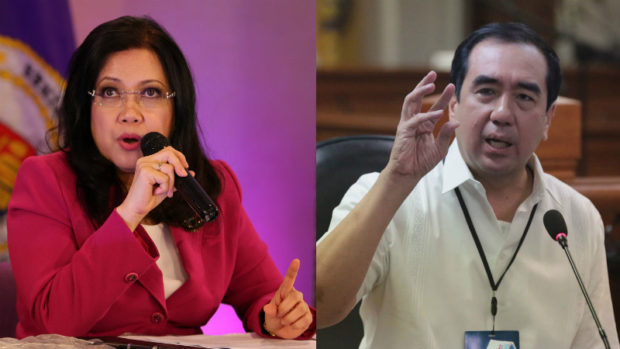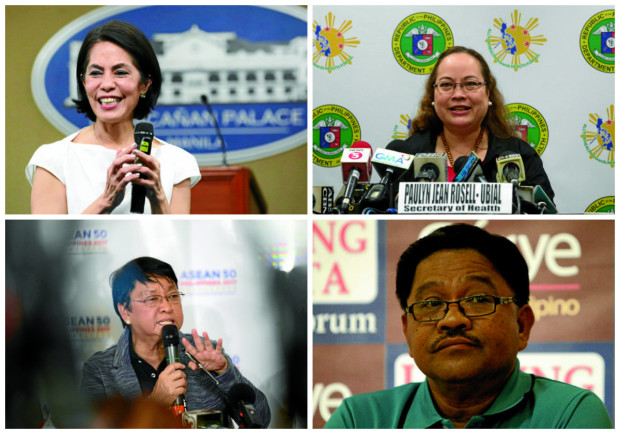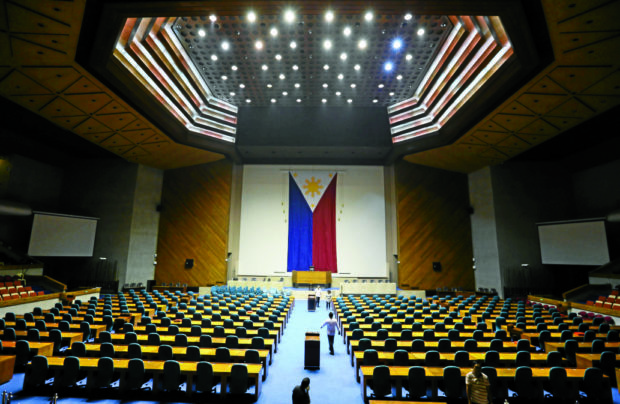The supermajority ruled it out in Congress
INQUIRER.net looks back at the issues in the Senate and the House of Representatives that became hot topics in 2017.
1. Senator Leila de Lima jailed
Nine months into her term as a neophyte senator, President Duterte’s fiercest critic Leila de Lima was put behind bars over what she described as trumped-up illegal drug charges. She was the first among Aquino’s former high-level officials to be detained under the present administration. In February 2017, a Muntinlupa City court ordered her arrest after it found substantial the testimonies of several Bilibid convicts, her former aides and Kerwin Espinosa, the biggest drug trader in Eastern Visayas. All of them claimed that De Lima profited from the drug business inside Bilibid when she was still Aquino’s Justice secretary. The former human rights chief maintains her innocence to this day.
2. Martial law gets overwhelming approval from Congress
It had not been difficult for President Duterte to get the Congress’ nod on the military takeover in Mindanao. At the height of the deadly Maute clashes in Marawi City, Duterte signed Proclamation No. 216 declaring military rule and suspending the privilege of writ of habeas corpus in the entire Mindanao. Both chambers—the Senate and House of Representatives—approved the measure overwhelmingly. Opposition legislators warning against the looming dictatorship with the approval of martial law declaration were easily outnumbered by Duterte’s allies in the Congress. This was also the case when Duterte sought the extension of military rule until the end of 2018.
3. Chief Justice, Comelec head face impeachment
The year 2017 proved unfortunate for Supreme Court chief magistrate Maria Lourdes Sereno and Commission on Elections (Comelec) Andres Bautista. Sereno is being tried in the House of Representatives for allegedly committing impeachable offenses. Four of Sereno’s co-justices in the high tribunal have so far testified against her but her camp maintains that their statements were merely driven by their personal grudges against Sereno. The House, meanwhile, found probable cause to impeach Bautista but he stepped down from Comelec, dodging trial in the Senate.

Supreme Court’s chief magistrate Maria Lourdes Sereno and Commission on Elections (Comelec) Andres Bautista. INQUIRER FILE PHOTOS
4. Powerful CA panel kicks out 4 from Duterte Cabinet
Four Duterte Cabinet members—former Environment Secretary Gina Lopez, Social Welfare Secretary Judy Taguiwalo, Former Agrarian Reform Secretary Rafael “Ka Paeng” Mariano, and Health Secretary Paulyn Ubial—failed to hurdle the bicameral Commission on Appointments (CA) this year. It was not a gloomy moment, however, for the eccentric Lopez as she even managed to serenade the media with her favorite song “I Believe I Can Fly” on the day she was rejected. Taguiwalo’s rejection was made even more controversial when Senator Vicente “Tito” Sotto III made his infamous “na-ano” remark on single mothers that offended many Filipinos.

From top left, clockwise: Environment Secretary Gina Lopez, Health Secretary Paulyn Jean Rosell-Ubial, Agrarian Reform Secretary Rafael Mariano and Social Welfare Secretary Judy Taguiwalo
5. PNoy shows up at Senate ‘Dengvaxia’ probe
Former President Benigno Aquino III drew both cheers and jeers when he appeared for the first time at a Senate hearing on his administration’s bungled vaccination program. Aquino was lauded for facing the investigation, sans the drama and the wheelchair. But the ex Chief Executive also drew flak for hastily allowing the purchase of the P3.5-billion worth of “Dengvaxia” anti-dengue vaccine in 2015.
6. Show tattoo, sign waiver: Paolo Duterte, Mans Carpio at corruption hearing
Davao City Vice Mayor Paolo Duterte and presidential son-in-law Mans Carpio’s appearance before the Senate investigation on the “tara system” in the Bureau of Customs gave birth to the battlecry of Duterte’s critics: Sign the waiver, show the tattoo. During the Senate blue ribbon hearing, the younger Duterte and Carpio denied allegations they were involved in the corruption and drug dealings within the Bureau of Customs (BOC). This was also where Senator Antonio Trillanes IV challenged Paolo to sign a bank secrecy waiver and show his back tattoo, allegedly proving the latter’s links to a Chinese triad drug group. And for boycotting the hearings, resigned BOC chair Nicanor Faeldon is still detained after Senators ordered him arrested for contempt.
7. Teens’ deaths, EJK probes expose ‘killer’ cops
Kian Loyd Delos Santos and Carl Angelo Arnaiz, both teenagers, both died in a Caloocan police operation. The Senate investigation on the death of 17-year-old Delos Santos and 19-year-old Arnaiz and other cases of extrajudicial killings exposed lapses in the Philippine National Police (PNP)’s anti-drug raids, with the top Caloocan police admitting before Senators that the information on Kian’s alleged drug involvement was merely sourced from social media. More than a dozen Caloocan policemen were charged with murder and planting of evidence over the deaths of the two boys. The controversy also united many legislators, setting aside their alliances in seeking probe on the EJK cases and condemning the PNP’s reinstatement of Supt. Marvin Marcos, the official that led the raid against slain Albuera, Leyte Mayor Rolando Espinosa Sr.
8. Frat loyalty tested in probe of Atio’s death
It was during the series of Senate hearings that Aegis Juris fraternity members showed how far they were willing to go to cover up the death of a colleague. Some Aegis members, however, proved that justice for slain University of Santo Tomas (UST) law student Horacio “Atio” Castillo III was far more important than their loyalty to the brotherhood. Senators were able to obtain Facebook messages of Aegis Juris members talking about trashing evidence and protecting suspects in the hazing where Atio died. Aegis Juris leader and debarred UST student Arvin Balag was detained after Senators cited him in contempt for not cooperating in the hearings. He was released through a resolution of the high court dated December 12.
9. Trillanes-Gordon war
The beef between Senator Antonio Trillanes IV and Senator Richard Gordon started with an exchange of fiery tirades over the latter’s handling of the Senate’s powerful blue ribbon committee. Who knew that this would later escalate to an exchange of ethics raps? Both senators accused each other of uttering unparliamentary language during one of the hearings on the P6.4-billion shabu shipment that went past the BOC.
10. ‘Undesirable 24’ gets zero funding from Congress
Some 24 opposition lawmakers got zero infrastructure funding for next year’s budget simply because they were “uncooperative” and “critical” of the Duterte administration. This move of the House leadership shocked the affected 24 representatives, as they decried the lack of budget for projects that would benefit their constituents. What Speaker Pantaleon Alvarez could tell the lawmakers about the cuts was: “You win some, you lose some. You can’t have your cake and eat it too.”

